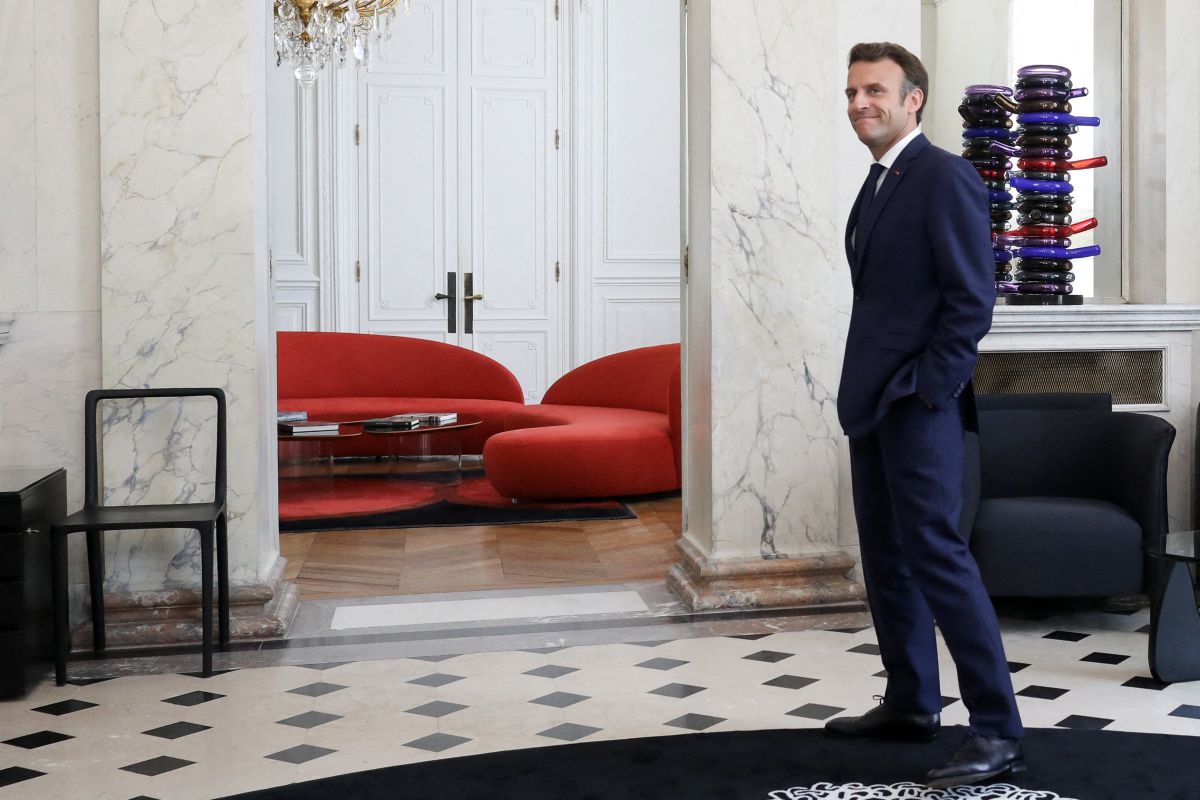French Politics after the Second Round of Parliamentary Elections
President Emmanuel Macron’s coalition fell well short of an absolute majority in the National Assembly (289 required of the chamber’s 577 seats). For both radical right-wing and left-wing voters, the limitation of the president’s power was of more importance than ideological differences. As a result, Marine Le Pen’s National Rally saw an unprecedented result, becoming the main opposition party. In the most likely scenario of a coalition with Republicans or moderate left and right politicians, the presidential camp, as the greatest political force in the Assembly, will seek to continue the current foreign policy and retain its representatives in key ministries.
 Lemouton Stephane/Pool/ABACA/Abaca Press/Forum
Lemouton Stephane/Pool/ABACA/Abaca Press/Forum
A New Balance of Forces
Candidates of the presidential coalition Together! (Ensemble!) won a total of 245 single-member constituencies (38.6% of votes in the second round). The left-wing bloc NUPES (Nouvelle Union populaire écologique et sociale), won 31.6% of the votes and a total of 131 seats in the Assembly, achieving a result resembling the pre-election polling. The results, though, do not allow the leader of the movement, Jean-Luc Mélenchon, to fulfil his aspirations to become prime minister and to preside over the formation of a new French government. The fate of the bloc in which most of the seats won (72) are held by Mélenchon’s La France Insoumise, followed by the Socialist Party (24), the Greens (23), and the Communist Party (12), remains uncertain. Mélenchon proposed the creation of one parliamentary group in the Assembly under the name NUPES, which was not unequivocally approved by the coalition partners.
National Rally (Rassemblement National, RN) exceeded expectations. It obtained 17.3% of the vote in the second round and will have 89 party members in the Assembly—a historic success for the party. It gives the party the ability to influence the internal functioning of the chamber. RN is now the second-largest political party in the Assembly after the presidential LREM (Renaissance), which secured only 160 seats within the coalition. In the context of the defeat in the presidential election, the Republicans (Les Républicains, LR) 61 seats and 7% of the votes can be considered satisfactory, especially as they will determine Macron’s ability to efficiently manage the state.
Factors Influencing the Election Results
The most important factor was the high level of electoral absenteeism, reaching 53.8%, and the demobilisation of the youngest electorate. In the second round, only 29% of eligible voters aged 18-24 and 34% of those aged 25-34 went to the polls. The highest turnout by age was recorded among the oldest voters (aged 70 and over) at 66%. People with higher incomes also voted more than those with lesser incomes. Turnout in France largely depends on the type of election. The older electorate assigns much more weight to parliamentary elections than the youngest voters, among whom there is a strong belief that the presidential election is decisive. The short interval between the two voting rounds (seven days) is also not conducive to mobilising the electorate between them. Also, the debate before the parliamentary elections was not very dynamic and was relatively weakly embedded in the broader reform programmes of individual parties. Additionally, the majority voting system means that a significant number of voters do not sympathise with the candidates who made it to the second round, leading to abstentions.
The election results were also influenced by the unusual flow of votes from the first round that cast doubt on the continued existence of a “republican front”—an informal alliance of voters against the extreme-right candidate. In the election campaigns, both by the left and the far right, there was strong criticism of Macron’s policy, which meant that voters outside the political centre stopped blocking each other’s candidates. Polling showed that in the case of a two-person duel between RN and NUPES candidates in the second round, only one in three Macron voters would be willing to vote for NUPES, and nearly half preferred to abstain. The motivation for some of these voters to back RN in a duel with NUPES could have been the desire to avoid the scenario of cohabiting the presidential camp with the left-wing bloc. At the same time, only 31% of NUPES voters declared they would vote in the second round for a candidate of the presidential majority, with 24% expressing they would vote against an RN politician, and 45% stating they would skip voting. In both cases, a vote for RN could be treated as a tactical vote. Among Republican voters, despite 37% absenteeism in the second round, RN could count on 27% and NUPES on 36%. The success of RN also could have been influenced by the fact that half of the Together! candidates eliminated in the first round chose not to instruct their voters, and only 26% of them called directly on them not to vote for the RN candidate.
The State of the Government and Presidential Majority
The head of state is faced with the necessity to reconcile his allies in a new composition of the Assembly, and thus to search for political compromises, which were not forced by the previous balance of power. Prime Minister Élisabeth Borne described this situation as unprecedented and threatening to France. The results raise questions about Macron’s ability to manage the country efficiently and implement the reforms announced in the campaign, in particular the pension reform. On the other hand, they create opportunities for the evolution of internal politics towards democracy based on inter-party dialogue and consensus, and for reducing the distance between citizens and their representatives.
It will be necessary to recompose the government to reflect the new political forces within the presidential majority (LREM has nearly 150 fewer deputies than in 2017) and the potential of a coalition partner. In addition, three members of the executive did not receive seats in the parliamentary elections—Environment Minister Amélie de Montchalin, Minister of Health Brigitte Bourguignon, and Secretary of State for the Sea Justine Benin. Richard Ferrand, chairman of the Assembly, and Christophe Castaner, chairman of the LREM faction, also lost their seats. As a result of the elections, the position of former Prime Minister Édouard Philippe strengthened on the political scene, as he brought 28 deputies into the Assembly on the side of the presidential majority coalition from the centre-right Horizons party, established in 2021. This should be considered in the longer term of the next presidential and parliamentary elections.
Conclusions and Perspectives
RN remains outside the pool of potential Macron coalition partners and will try to build strong opposition in the Assembly. Le Pen’s goal is to focus on leading the parliamentary group and strengthening the party’s voice in parliamentary commissions. An alliance of the two strongest electoral blocs remains an unlikely scenario, although some socialists may be involved in creating the majority. Republicans are most often mentioned as a potential coalition partner of Macron, being the closest to the centre-right political profile of the government. However, after the announcement of the results, the party leader Christian Jacob declared that it would remain in opposition and would support bills that follow the party’s line. The position of LR could determine the future of the Assembly.
If the government is forced to constantly seek alliances in the coming term, it is possible that the president may dissolve the chamber under Art. 12 of the constitution, although that carries the risk of another period of cohabitation. The prime minister also has the option of applying Art. 49 sec. 3 of the constitution, which entitles a bill to be adopted in open court without voting. Nevertheless, it carries the risk of a call for a motion of no confidence in the government by deputies.
In the coalition negotiations, the presidential camp will want to keep key ministers in the government. This concerns in particular Clément Beaune, who is responsible for European politics, the new minister of foreign affairs, Catherine Colonna, and the minister of the armed forces, Sébastien Lecorn. The presidential majority based the campaign on a pro-European programme in opposition to the slogan of “European disobedience” promoted by NUPES, and on its basis the government will continue its activities, counting on the support of the vast majority of deputies representing pro-EU parties and relying on the president’s constitutional prerogatives in the area of foreign policy.


